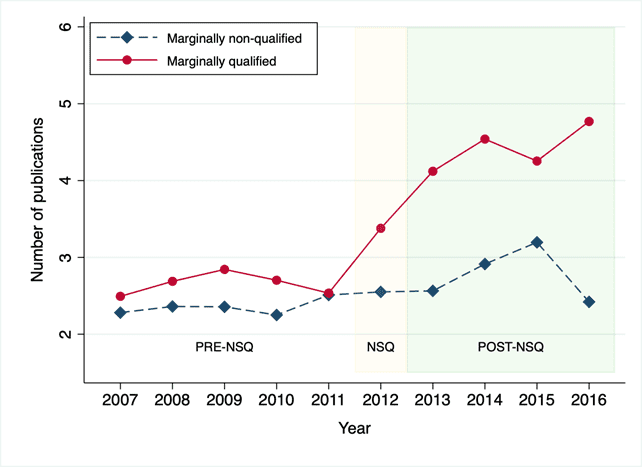#EconomicPolicy
#EconomicPolicy74
Clear Promotion Incentives Boost Public Sector Productivity
Evidence from scholarly output in Italian universities
Promotion incentives that layout clear and objective thresholds that must be achieved to make career progress can be a key motivating tool to foster the productivity of high-skilled public employees. That is the conclusion of new research by Marco Nieddu (University of Cagliari and CRENoS) and Lorenzo Pandolfi (University of Naples and CSEF).
Making use of the features of the centralised procedure that regulates career advancement in Italian academia – the National Scientific Qualification (Abilitazione Scientifica Nazionale) – the authors show that academics employed in public universities respond strongly to variations in the promotion thresholds they face. Scholars who must reach (sufficiently high) promotion bars – defined in terms of research outputs – to climb the academic ladder significantly increase their research productivity.
More…
Many countries have recently introduced centralised evaluation procedures to regulate career advancement in public organisations, such as public universities. For example, to become a university professor in France, Germany, Italy and Spain, scholars first need to achieve a national qualification, typically awarded based on their academic curriculum vitae.
These centralised procedures offer the opportunity to shed light on an important, yet relatively unexplored topic: the response of high-skilled public employees, such as academics, to promotion-based incentives.
Since 2010, eligibility for the status of associate and full professor in Italian universities has been conditional on obtaining the National Scientific Qualification (NSQ), awarded by national committees evaluating candidates’ research activity. To get the qualification, applicants need to overcome some bibliometric thresholds defined in terms of published articles, citations and h-index.
The study by Nieddu and Pandolfi makes use of these cut-offs to study the productivity of a sample of about 5,000 assistant professors exposed to heterogeneous career incentives depending on the outcome of the first round of the NSQ in 2012.
For assistant professors who obtain the associate professor qualification in 2012, the next goal becomes to meet the higher requirements for the full professor qualification. The goal of their otherwise identical non-qualified colleagues remains to meet the (already close) associate professor thresholds.
The authors show that qualified scholars publish six more articles than their non-qualified colleagues in the subsequent four years (see Figure 1). Importantly, this increase in the quantity of publications does not come at the expense of their average quality, proxied by different measures of journals’ prestige.
Furthermore, the effectiveness of the promotion incentives is stronger for those scholars who face a promotion threshold (for full professorship) that is neither too close nor too far. This is consistent with several theoretical models in economics showing that promotion incentives are maximised when the promotion is neither too easy nor too hard to achieve.
These findings suggest that centralised evaluation procedures based on observable and well-defined productivity indicators can effectively promote productivity in academia, thus fostering the production of knowledge. This is particularly important for all those countries in which the system of higher education is predominantly public.
More broadly, the findings highlight that meritocratic, output-based promotion rules can be the most effective motivational tool in public organisations, especially in light of the legislative and budget constraints that make it usually hard to implement pay-for-performance schemes such as those often used in the private sector.

Figure 1: Year-by-year effect of the National Scientific Qualification (NSQ) on the number of publications.
‘The Effectiveness of Promotion Incentives for Public Employees: Evidence from Italian Academia’
Authors:
Marco Nieddu (University of Cagliari and CRENoS)
Lorenzo Pandolfi (University of Naples and CSEF)






